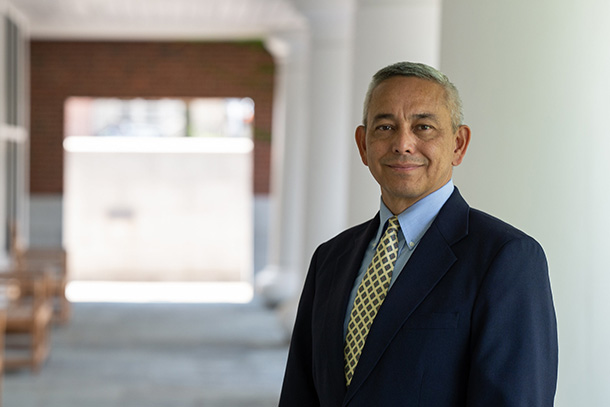
Rob Rabb was named the new associate dean of education for the Penn State College of Engineering, effective Aug. 1. Credit: Kelby Hochreither/Penn State
Associate dean of education for the College of Engineering named
August 3, 2022
By Sarah Small
UNIVERSITY PARK, Pa. — With professional experiences ranging from teaching engineering to future military officers at West Point to establishing the mechanical engineering program at The Citadel, Rob Rabb has developed a guiding belief to underpin his approach to education. He summed up this belief in one sentence: “Engineers can do a lot for a society, whether in industry or academia, but first they need a strong foundation — not just with technical knowledge but with skills like teamwork, communication and leadership.”
This philosophy is one that he will apply in his new role as associate dean of education for the Penn State College of Engineering. Rabb started in the position on Aug. 1.
“Rob brings significant experience and understanding of educational needs from his military service and time in academia,” said Justin Schwartz, Harold and Inge Marcus Dean in the College of Engineering. “He has a proven track record for both establishing great engineering programs and taking them to the next level. We welcome his vision and commitment to excellence in education to the Penn State College of Engineering.”
As a high school senior, Rabb knew that he wanted to major in a STEM field, so when he entered the United States Military Academy (West Point), he did so as a physics major. But after taking some engineering classes and consulting with a faculty member, he switched to mechanical engineering and, he said, never looked back.
“By my junior or senior year, I realized how much I really liked engineering and the impact I could make with the skills I was learning,” Rabb said.
Early in his military career, Rabb had the opportunity to return to West Point to teach after earning his master’s degree from the University of Texas at Austin. While quite a few officers complete a teaching tour of duty and enjoy it, according to Rabb, not nearly as many request to do a second tour of teaching. Rabb was in this minority.
“A lot of my peers thought it was great to be a West Point and teach, but they didn't want to do it, the second time; they wanted to stay out in the field,” Rabb said. “But I thought, ‘Wow, this is really impactful. I've taught 200 seniors since I've been here, and I’ll see a lot of them out there in the military again.’ And I did.”
After completing his doctorate in mechanical engineering from University of Texas at Austin, he was assigned a second teaching tour. It was during this time that Rabb learned more about mentoring other faculty members, not just students.
“During the first tour of teaching, you're surviving as a junior faculty member, but then, when you go back again, you have your doctorate degree, you know publications, the value of scholarship and mentoring,” he said. “So, because of that, I was able to help mold some of the junior faculty and open some doors for them. That allowed me to see the impacts more senior faculty members can make.”
After retiring from the Army in January 2014, Rabb remained committed to education and professional development of both students and other faculty and accepted a position establishing a mechanical engineering program at The Citadel, the Military College of South Carolina.
“The Citadel is a teaching institution, so there is a lot of fertile ground to continue along the stream of looking at what works in engineering education, what's making a difference and where the data points say we ought to be paying attention,” he said.
Under Rabb’s leadership, The Citadel’s mechanical engineering program has grown into one of the most popular majors for incoming first-year students, and alumni have an almost 100% employment rate 60 days after graduation. Rabb plans on applying some of what he learned through the process of establishing the program in his new role at Penn State.
“Engineering education excellence will always be a top priority, from individual programs to institutional impact, especially as we continue looking at different modes of teaching,” he said “Whether it’s in person or online or hybrid, we must still deliver a quality product. I’d also like to place emphasis on more students going into the graduate programs and on professional development opportunities for faculty and staff.”
Rabb — who is also a professor in the School of Engineering Design, Technology, and Professional Programs — said that he is also looking forward to the position because of the positive environment he feels that the Penn State College of Engineering fosters.
“My whole interview process was unbelievably positive,” he said. “There are a lot of great people in the college, and I'm looking forward to working with the great staff and faculty at Penn State. I want to continue the University’s traditions of excellence.”



